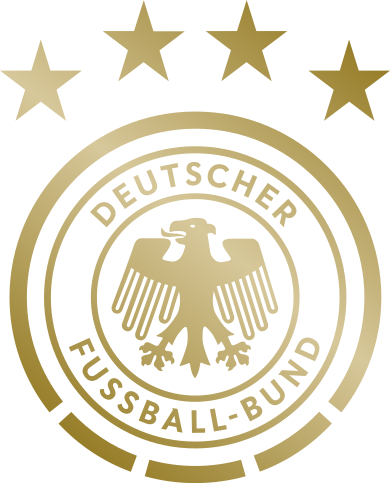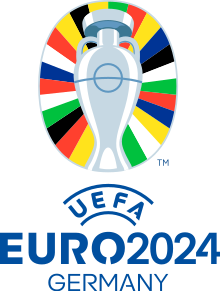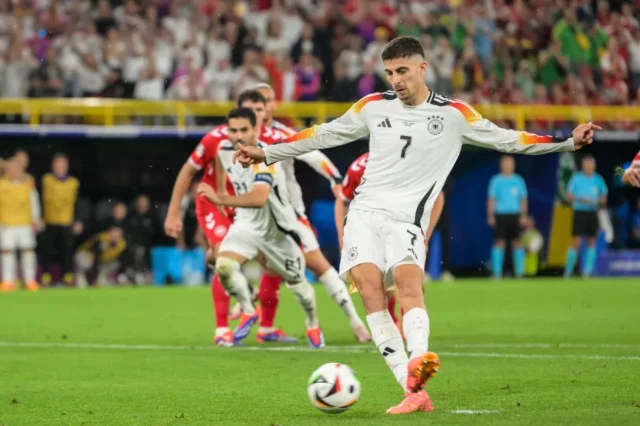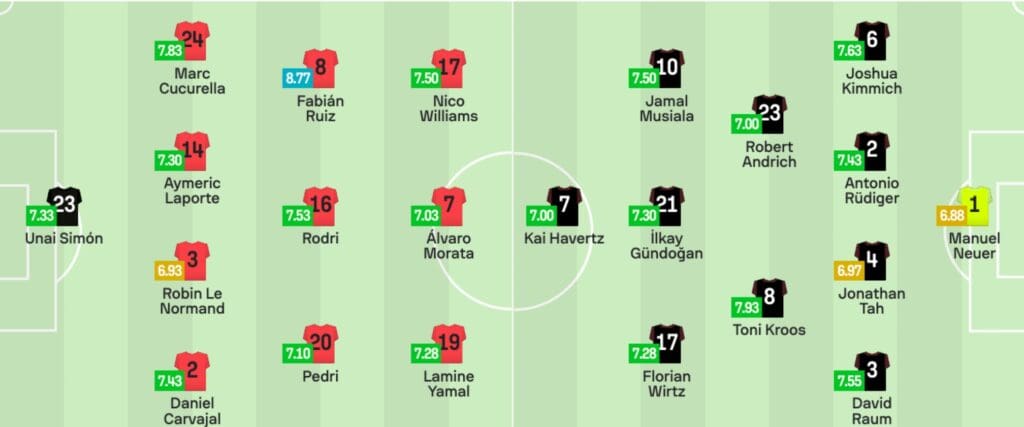Spain vs Germany predictions for this Euro 2024 massive clash. Spain and Germany, both aiming for a fourth European Championship title, clash in the Euro 2024 quarter-finals at MHPArena, Stuttgart. Read on for our free betting tips and predictions.


European Championship | Quarter-Finals – Jul 5, 2024 at 5pm UK at Mercedes-Benz-Arena

Don’t have a William Hill account? Click below to claim this offer👇
Spain vs Germany Predictions
Key Stats
– Spain have won all their matches in Euro 2024, scoring nine goals and conceding only one.
– Germany are the top scorers of the tournament with ten goals, showcasing their attacking prowess.
– Both teams are ranked in the top two for expected goals, with Spain at 8.5 and Germany at 8.4, indicating a potentially high-scoring match.
Will Spain’s Perfect Record Outshine Germany’s Home Advantage in Euro 2024 Quarter-Finals?
Spain and Germany are set to face off in the quarter-finals of Euro 2024, with both teams aiming for a historic fourth European Championship title. The match, to be held at the MHPArena in Stuttgart, promises to be a thrilling encounter between two of Europe’s most decorated footballing nations.
Match Preview
Spain have been a revelation in this tournament, maintaining a perfect record through their group stage matches and their last-16 tie. Their campaign has been characterised by a blend of traditional possession-based football and a new-found directness, making them one of the most versatile and dangerous teams in the tournament.
They opened their group stage with a dominant 3-0 win over Croatia, followed by a hard-fought 1-0 victory against Italy, and capped it off with a 1-0 win over Albania. Their attacking prowess was on full display as they overcame Georgia 4-1 in the round of 16, showcasing their ability to come from behind and dominate matches.
Germany, the tournament hosts, have also shown their quality, topping Group A with seven points. Their journey began with a resounding 5-1 win against Scotland, followed by a more measured 2-0 victory over Hungary, and concluded with a 1-1 draw against Switzerland.
In the round of 16, they battled past Denmark with a 2-0 win, despite a controversial VAR decision that went in their favour. Julian Nagelsmann’s side has been potent in attack, scoring ten goals so far, but they have also shown vulnerability, particularly in their match against Switzerland.
Team Analysis
Spain’s success has been built on a solid defensive foundation and a dynamic attack. Luis de la Fuente has favoured a 4-3-3 formation, with Unai Simón in goal, a back four of Dani Carvajal, Robin Le Normand, Aymeric Laporte, and Marc Cucurella. The midfield trio of Rodri, Pedri, and Fabián Ruiz has been pivotal, combining defensive solidity with creative flair. Up front, the youthful exuberance of Lamine Yamal and Nico Williams, alongside the experience of Álvaro Morata, has been a constant threat to opposition defences.
Germany, under Nagelsmann, have also preferred a 4-3-3 setup. Manuel Neuer anchors the team from goal, with a defensive line featuring Joshua Kimmich, Antonio Rüdiger, Jonathan Tah, and David Raum. The midfield is marshalled by Toni Kroos, Ilkay Gündoğan, and Robert Andrich, providing a mix of creativity and control. Jamal Musiala, Kai Havertz, and Florian Wirtz lead the attack, bringing pace, skill, and clinical finishing to the fore.
Key Players
For Spain, Fabián Ruiz has been exceptional, leading the team with his two goals and two assists. His ability to control the tempo and contribute offensively has been crucial. Nico Williams has also impressed with his pace and directness, while Lamine Yamal has shown maturity beyond his years.
Germany’s standout player has been Jamal Musiala, who is among the top scorers in the tournament with three goals. His dribbling and vision have been vital in breaking down defences. Kai Havertz has also been effective, providing a physical presence and scoring crucial goals.
Predicted Lineups
Spain: Simón; Carvajal, Le Normand, Laporte, Cucurella; Rodri, Pedri, Ruiz; Yamal, Morata, Williams
Germany: Neuer; Kimmich, Rüdiger, Tah, Raum; Kroos, Andrich, Gündoğan; Musiala, Havertz, Wirtz
Tactical Analysis: Deep-Dive
Spain’s Offensive and Defensive Approaches
Spain have showcased a remarkable blend of traditional possession football and a more dynamic, direct approach in Euro 2024. Offensively, they utilise a 4-3-3 formation, focusing on high possession, quick passing, and exploiting the wide areas through wingers Nico Williams and Lamine Yamal. Both have been pivotal, stretching defences and creating numerous scoring opportunities. Yamal’s ability to take on defenders and Williams’ pace have been significant in Spain’s high shot and goal tally. The midfield trio of Rodri, Pedri, and Fabián Ruiz supports this by controlling the tempo and providing incisive passes.
Defensively, Spain have been solid, conceding only once, and that too an own goal. The back four, marshalled by Aymeric Laporte and Robin Le Normand, has been resolute, with Dani Carvajal and Marc Cucurella adding width and defensive stability. Their high pressing game starts from the front, with Álvaro Morata often leading the press, making it difficult for opponents to build from the back. Spain’s ball recovery stats, notably Rodri’s contributions, show their effectiveness in regaining possession quickly, reducing the pressure on their defence.
Germany’s Offensive and Defensive Approaches
Germany, under Julian Nagelsmann, have adopted a high-tempo, attacking style, primarily utilising a 4-2-3-1 formation. Offensively, they have been prolific, scoring ten goals so far, driven by the creative talents of Jamal Musiala and Florian Wirtz. Musiala, in particular, has been outstanding, using his dribbling skills and vision to unlock defences and create chances for Kai Havertz, who leads the line with physical presence and clinical finishing. Germany’s wing play, with support from full-backs Joshua Kimmich and David Raum, has also been crucial in creating width and delivering crosses into the box.
Defensively, Germany have shown some vulnerabilities, especially in transitional play. While Antonio Rüdiger provides strength and leadership at the back, the defensive unit has been prone to lapses, as seen in their group stage draw against Switzerland. The midfield duo of Toni Kroos and Ilkay Gündoğan, while excellent in possession, occasionally leaves gaps that opponents can exploit, a weakness that Spain might target with their quick transitions and wide play.
Key Player Performances
Spain
Fabián Ruiz has been the standout performer for Spain, leading the team with his goals and assists. His ability to control the midfield and contribute offensively has been crucial. Nico Williams has impressed with his pace and directness, while Lamine Yamal has brought creativity and flair. Rodri’s defensive contributions and distribution have been vital in maintaining Spain’s structure and initiating attacks from deep.
Germany
Jamal Musiala has been Germany’s key player, leading the tournament’s scoring charts and providing critical assists. His dribbling and vision have been instrumental in breaking down defences. Kai Havertz has also been effective, providing goals and physical presence in the attacking third. Antonio Rüdiger has been solid at the back, but the defensive unit as a whole needs to tighten up to support Germany’s attacking ambitions.
Managerial Impact
Luis de la Fuente
Luis de la Fuente has successfully transformed Spain into a more dynamic and adaptable team. His willingness to incorporate young talents like Yamal and Williams has paid off, adding a new dimension to Spain’s play. De la Fuente’s tactical flexibility, blending traditional possession with a direct approach, has made Spain unpredictable and difficult to defend against. His emphasis on high pressing and quick transitions has been particularly effective, as evidenced by Spain’s high number of shots and goals.
Julian Nagelsmann
Julian Nagelsmann has brought a fresh, attacking philosophy to Germany, emphasising high tempo and creativity. His tactical acumen in deploying players like Musiala and Havertz in roles that maximise their strengths has been a highlight. However, Nagelsmann’s approach has also exposed Germany defensively, especially in transitional situations. His reliance on high pressing has occasionally left the team vulnerable at the back, a factor that could be exploited by Spain’s quick and skillful attackers.
Expected Goals Analysis
Spain and Germany top the expected goals (xG) charts in Euro 2024, with Spain at 8.5 and Germany at 8.4. This indicates both teams’ ability to create high-quality chances. Spain’s high xG reflects their dominance in possession and shot creation, with players like Fabián Ruiz and Nico Williams frequently finding themselves in goal-scoring positions. Germany’s xG is driven by their attacking prowess, particularly through Musiala and Havertz, who have been efficient in converting chances.
Tactical Comparison and Overall Success
Spain’s tactical approach has been a balance of possession and directness, making them versatile and effective against different styles of play. Their high number of shots and goals, combined with solid defensive performances, have made them the standout team of the tournament. Germany, on the other hand, have focused on high-tempo attacking football, which has yielded high goal numbers but also exposed defensive frailties.
In terms of player performances, Spain’s midfield trio and wide attackers have been consistently impactful, while Germany’s attack, led by Musiala and Havertz, has been their main strength. Defensively, Spain have been more solid and consistent, whereas Germany have shown weaknesses that need addressing.
Suggestions for Improvement
Spain
- Utilise the Bench: Spain could benefit from more rotation to keep players fresh. Introducing fresh legs, especially in the attacking third, could maintain their high-intensity play throughout the match.
- Improve Conversion Rate: Despite their high number of shots, Spain could improve their conversion rate. More clinical finishing from their forwards could make a significant difference.
Germany
- Strengthen Defensive Organisation: Germany need to improve their defensive transitions to avoid being caught out of position. Better communication and positioning among the backline and midfielders would reduce their vulnerability to counter-attacks.
- Control Midfield Better: While their attacking play has been excellent, Germany could benefit from better control in midfield. This would help in maintaining possession and reducing pressure on their defence.
Strengths and Weaknesses
Spain’s Strengths
- Dynamic Attack: Spain’s blend of possession and direct play makes them unpredictable and versatile.
- Defensive Solidity: Conceding only one goal (an own goal) shows their defensive strength.
Spain’s Weaknesses
- Reliance on Youth: While their young players have been impressive, their inexperience could be a factor in high-pressure situations.
Germany’s Strengths
- High Tempo Attack: Germany’s ability to score goals in quick succession has been a key strength.
- Home Advantage: The support from home fans provides a significant boost.
Germany’s Weaknesses
- Defensive Vulnerability: Their high pressing leaves them exposed in defensive transitions.
- Inconsistent Performances: Germany have shown inconsistency, struggling in some matches despite their overall attacking success.
Managerial Critique
Julian Nagelsmann’s approach, while ambitious and exciting, has been flawed due to his lack of emphasis on defensive stability. His aggressive, high-pressing tactics, while effective in attack, have often left his team exposed at the back. This has been evident in their matches where they have struggled to maintain a solid defensive structure, particularly against swift counter-attacks.
Nagelsmann’s reluctance to adjust his tactics to ensure better defensive organisation has been a significant weakness, potentially jeopardising Germany’s chances against top-quality opposition like Spain.
Predictions
Spain to Qualify
Spain’s progression to the semi-finals seems the most plausible outcome given their current form and overall performance in Euro 2024. Under Luis de la Fuente, Spain have displayed a blend of tactical discipline and attacking flair, making them the tournament’s standout team so far.
Their unbeaten run and comprehensive victories highlight their ability to adapt and overcome various challenges. Germany, while strong, have shown vulnerabilities, especially in tight situations as evidenced by their performance against Denmark. Spain’s cohesive unit, bolstered by young talents like Nico Williams and seasoned campaigners like Álvaro Morata, can exploit these weaknesses, ensuring Spain’s advancement after what is expected to be a hard-fought encounter, possibly extending into extra time or even penalties.
Correct Score: Spain 2-1 Germany (After Extra Time)
A 2-1 victory for Spain after extra time appears to be a realistic prediction given the dynamics of both teams. Spain’s ability to control the tempo of the game and their recent offensive form, scoring an average of 2.3 goals per game, suggests they can breach Germany’s defence. However, Germany’s home advantage and their own attacking threat, having netted 10 goals in the tournament, indicate they will not go down without a fight.
The prediction of a 2-1 scoreline reflects the anticipated balance of power – Spain’s superior tactical execution should see them edge out a resilient German side, with the match likely extending beyond the regular 90 minutes due to the high stakes and quality of both teams.
Goalscorer Prediction: Nico Williams
Nico Williams has emerged as a significant attacking threat for Spain, with his pace and dribbling ability causing problems for defences throughout the tournament. His direct style of play and capability to cut inside and shoot make him a prime candidate to score.
Considering Germany’s occasional defensive lapses, especially against quick and skilful wingers, Williams is likely to find himself in goal-scoring opportunities. His performance against Georgia, where he was pivotal in stretching the defence and creating chances, underscores his potential to be on the scoresheet in this crucial match.
Corner Prediction: Spain to Win the Corner Count
Spain’s attacking style and tendency to dominate possession lead to numerous opportunities from set-pieces, particularly corners. Averaging 7.3 corners per game, Spain’s ability to sustain pressure and create chances from wide positions should see them win the corner count against Germany.
While Germany have also been effective in generating corners, Spain’s methodical approach in the final third and frequent wing play give them the edge. Expect a total corner count around 10-12, with Spain marginally outdoing Germany due to their sustained offensive efforts.
Shot on Target Prediction: Fabián Ruiz to Have 1+ Shots on Target
Fabián Ruiz’s midfield presence and knack for finding space in attacking positions make him a solid bet for having at least one shot on target. His ability to take long-range efforts and arrive late in the box add to his threat.
Given Spain’s overall shot output of 20.5 per game, Ruiz’s involvement in the attacking phases ensures he will have opportunities to test the German goalkeeper. His two goals and two assists in the tournament so far reflect his integral role in Spain’s attacking play, making this prediction well-founded.
Yellow Card Prediction: Rodri
Rodri’s role as the defensive anchor in Spain’s midfield often necessitates tactical fouls to break up opposition attacks. His physical style and critical positioning mean he is frequently involved in challenges that could lead to bookings.
With Germany’s dynamic midfield, featuring players like Jamal Musiala and Ilkay Gündoğan, Rodri is likely to face numerous situations where committing a foul might be necessary to halt dangerous plays. His previous bookings and the nature of this high-stakes match make him a likely candidate for receiving a yellow card.
Assist Prediction: Dani Olmo
Dani Olmo’s vision and creativity make him a prime candidate for providing an assist. His ability to unlock defences with precise passes and his movement between the lines have been pivotal for Spain. Olmo’s track record in this tournament, coupled with his playmaking skills, positions him as a key provider in Spain’s attack. With players like Morata and Williams making intelligent runs, Olmo’s ability to deliver the final ball will be crucial, and he is well-placed to register an assist against Germany.
Innovative Market: Total Cards Under 4.5
Given the disciplined defensive approaches of both teams and the high stakes of this quarter-final clash, a controlled match with fewer fouls and cautions is anticipated. Both Spain and Germany have shown relatively clean records in terms of discipline, with Spain averaging 1.5 yellow cards per game and Germany 1.3.
This suggests a likelihood of fewer total cards, under 4.5, particularly in a match where both sides will aim to avoid costly suspensions for potential semi-final appearances. The refereeing style and the importance of maintaining composure in such a high-profile game further support this prediction.
Top UK Bookies & Best Sign Up Offers
Subscribe To Our Newsletter For Exclusive Tips
Want to have exclusive tips from experts tipsters delivered right into your inbox? Subscribe Now To Our Newsletter. We will never spam, we fully respect your privacy!



























